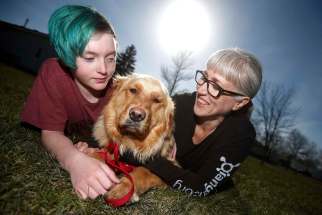Looking for the pawsitive Pet adoptions on the rise as pandemic unleashes desire for connection
Read this article for free:
or
Already have an account? Log in here »
To continue reading, please subscribe:
Monthly Digital Subscription
$0 for the first 4 weeks*
- Enjoy unlimited reading on winnipegfreepress.com
- Read the E-Edition, our digital replica newspaper
- Access News Break, our award-winning app
- Play interactive puzzles
*No charge for 4 weeks then price increases to the regular rate of $19.00 plus GST every four weeks. Offer available to new and qualified returning subscribers only. Cancel any time.
Monthly Digital Subscription
$4.75/week*
- Enjoy unlimited reading on winnipegfreepress.com
- Read the E-Edition, our digital replica newspaper
- Access News Break, our award-winning app
- Play interactive puzzles
*Billed as $19 plus GST every four weeks. Cancel any time.
To continue reading, please subscribe:
Add Free Press access to your Brandon Sun subscription for only an additional
$1 for the first 4 weeks*
*Your next subscription payment will increase by $1.00 and you will be charged $16.99 plus GST for four weeks. After four weeks, your payment will increase to $23.99 plus GST every four weeks.
Read unlimited articles for free today:
or
Already have an account? Log in here »
Hey there, time traveller!
This article was published 15/05/2020 (2033 days ago), so information in it may no longer be current.
Mindy was only supposed to be a temporary member of Sunny Szpak-Holly’s family.
But two weeks after Szpak-Holly took the 18-month-old golden retriever/great Pyrenees into her home as a foster pup, “we’d fallen in love and she wasn’t going to leave.”
Szpak-Holly is just one of many Winnipeggers who decided to welcome a four-legged friend during the coronavirus crisis. An uptick in adoptions and fosters is a trend that can be seen all over North America, and it makes sense: people are spending a lot more time at home these days.
Szpak-Holly, 44, is a longtime foster-dog parent. “I love being able to help a dog short term, and the costs are covered by the rescue,” she says. “It’s a great way to help out an animal.”
Not surprisingly, she’s also a volunteer with the Manitoba Great Pyrenees Rescue, which has also seen the COVID-19 effect. Szpak-Holly says that in the past, if the rescue posted a photo of dog, it might receive 10 applications. Now, it gets 50-plus.
“You pretty much have to know someone to be able to adopt now,” she says. “I love it.”
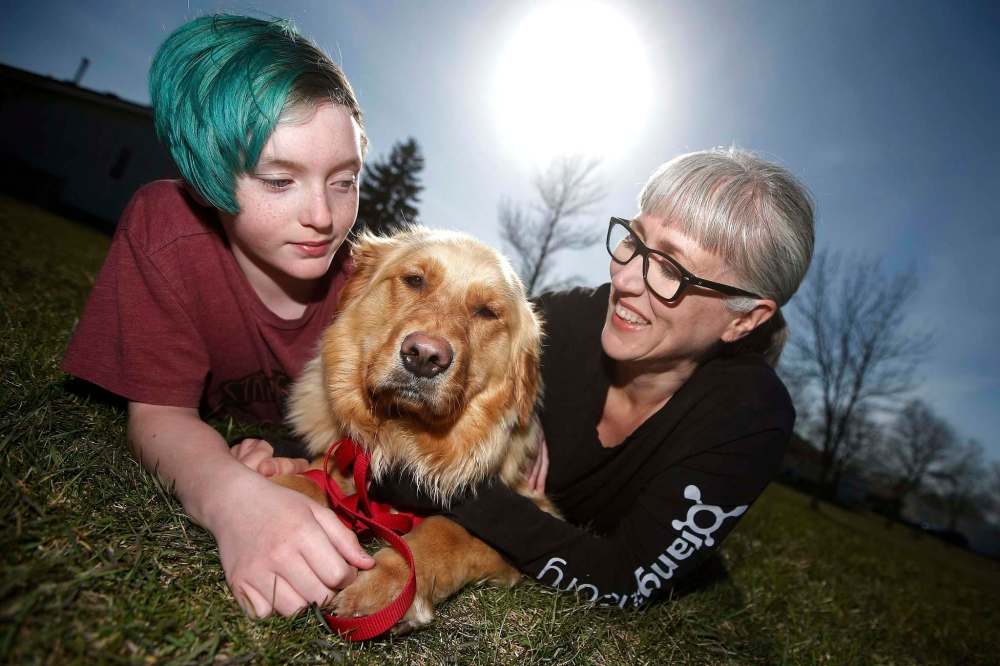
Javier Schwersensky, the CEO of the Winnipeg Humane Society, suspects many people are craving companionship in the age of self-isolation and social distancing.
“It’s great that I can have a call or even see my mom on Mother’s Day from the yard — but it’s not the same,” he says. “You can hug a pet. You can have them on your lap. You can play with an animal. I think, personally, that’s why people are willing to go through all the hoops we have in place to get to the point of an adoption.”
The pandemic has changed the way things are done at the humane society. For one, the organization had to reduce the number of animals it could take in — though Schwersensky stresses that no animal that is sick, injured or needs a place to go is left behind — and had to lock its doors to the public.
“In the past, you could browse online the animals available for adoption and come and take a look, and then come again,” he says. “Essentially, what you do now is you have to schedule an appointment, and we have no more than three appointments on the hour. We screen you on the phone, both from a health perspective and how serious you are about adopting. Then you come and you have to make a decision.”
“The heartwarming thing is a lot of people are turning to the humane society and other animal rescues as opposed to buying an animal.” – CEO of the Winnipeg Humane Society Javier Schwersensky
Despite the added barriers, people are still choosing pets. In April 2020, there were 185 adoptions, compared with 245 in April 2019. “If you put that in perspective in terms of the number of adoptions per hour, and based on the available animals for adoption, it’s quite high,” Schwersensky says. And because people are adopting so quickly, the impact of taking in fewer animals has been minimal.
One thing that hasn’t changed, Schwersensky says, is the society’s dedication to making sure adoptions are set up for the highest chance of success so that animals don’t wind up back at the shelter. During a pandemic or not, people need to understand adopting an animal is a long-term commitment. As he says, “the job of an adoption counsellor is not to encourage you to take the animal — it’s to discourage you.
“What we are is very upfront. You have the full medical history that we’re aware of and whatever our vets know about the pet. We do a full disclosure in terms of any behavioural challenges we have seen. Then we ask a lot of questions about you and who is living with you, and we want to see everyone, even if it takes us several appointments to ensure that everyone who will be living with the animal is committed.”
Schwersensky has been buoyed by the way the community has responded during the crisis. “The heartwarming thing is a lot of people are turning to the humane society and other animal rescues as opposed to buying an animal,” he says.
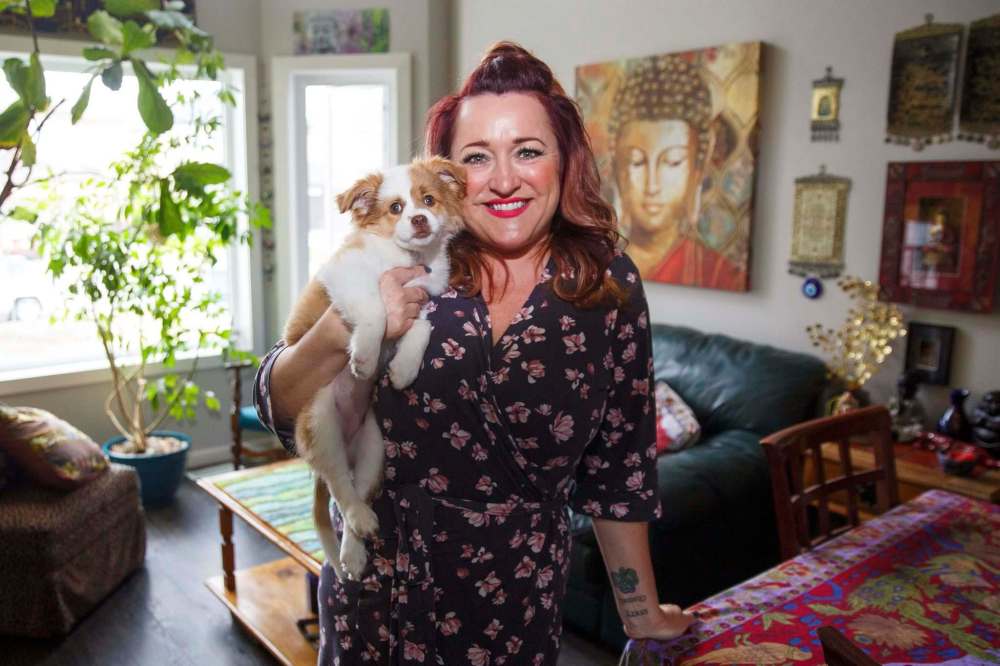
Agata Ploszanski went the rescue route for the first time, at the behest of her daughter. Ploszanski, who is in her 40s, and her fiancé have grown kids who have all returned to the nest because of the pandemic, and she figured that now would be a good time to explore getting a puppy. Everyone’s home, which means everyone can help.
“I wanted a puppy because we wanted some oogly-googly love in our home,” she says with a laugh. Her family had to put down one of their dogs last year, which was particularly hard on her son. “I knew there was so much sadness that he still carried because it was his dog and she was so sick in the end, so I wanted to have some joy.”
One of Ploszanski’s friends volunteers for Spirit of Hope Rescue, and got a lead on a litter of puppies born outside Thompson. A few weeks later, Ploszanski and her family welcomed Nina, a tiny Australian shepherd mix, to their home.
“I’m insanely in love with this puppy,” Ploszanski says. Nina has been a great distraction during a time when motivation can be low. “She’s been such a great addition, and it felt good to rescue a puppy.”
Over at Winnipeg Pet Rescue Shelter, founder and executive director Carla Martinelli-Irvine has noticed another encouraging trend over the past few weeks: an uptick in adoptions of senior cats — including, recently, a nine-year-old cat who had been at the shelter for two years. “Which is just wonderful,” she says. “It makes us all feel really happy.” It also frees up medical funds to help other animals.
“People are lonely. Animals bring that sense of comfort. I think people are scared as well. If they’ve got something to sit with them at night and stroke, it gives people the sense of being needed, and I think everybody needs to feel needed.” – Carla Martinelli-Irvine, Winnipeg Pet Rescue Shelter
For the past several weeks, Martinelli-Irvine and her staff have been working hard to make sure they’re keeping the staff and public safe while providing an essential service. Only six people are allowed in the shelter at a time. Masks are available to be worn while in the shelter, and hand sanitizer is dispensed by staff.
The Winnipeg Pet Rescue Shelter believes in full disclosures. “People need to know what they’re getting into; a surprise is not a good thing when you first adopt. When people are adopting these older ones who maybe have health issues, they’re really good people for taking them.”
As for why people are taking a second look at older cats, Martinelli-Irvine suspects it may have something to do with heightened empathy and compassion.
“On a personal level, the amount of suffering we’re seeing is just heartbreaking,” she says. “There’s a lot of extra prayers at night. We recognize that a lot of people are alone, and they’re not so blessed to have family around them, or they’re not able to see their families.
“People are lonely. Animals bring that sense of comfort. I think people are scared as well. If they’ve got something to sit with them at night and stroke, it gives people the sense of being needed, and I think everybody needs to feel needed.”
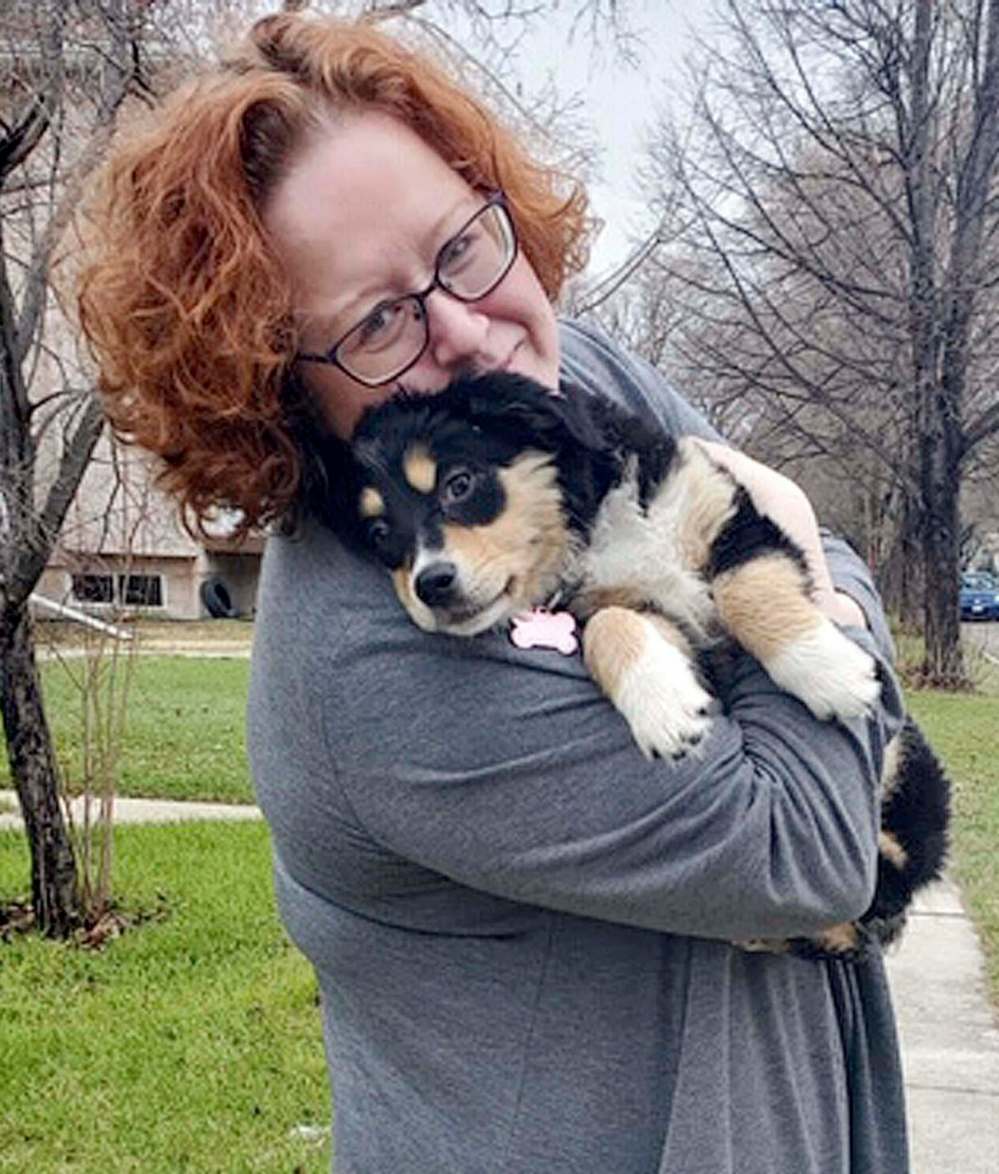
Nicole Chammartin is the executive director of Klinic Community Health Centre and SERC. She’s also the owner of a new pandemic puppy: a bossy little basset hound/shepherd mix named Covie.
“It’s a little inspired by COVID for sure,” Chammartin says of her name (it’s also a term of endearment for a witch’s covenant). “It’s a word I was saying a lot. I didn’t want to be disrespectful; for a lot of people, COVID has been pretty traumatic, and I want to recognize that. For me, it was an opportunity to find some light in the darkness.
“At Klinic we run the crisis lines, so we talk to people every day who are struggling with this pandemic, and (adopting a pet) is actually one of the things that we talk about. We tell people, if they’re considering adopting, to make sure they’re really thoughtful about that, and consider fostering for sure. One of the things we’ve been saying is how much we notice people just saying the word COVID. Words have power. And I think for me, it was a little bit of taking the word and doing something else with it.”
Covie comes to Chammartin from Manitoba Underdogs Rescue, which she says has been amazing to work with. Covie is a high-needs pup, and Chammartin has been supported by both the rescue and Covie’s foster parents throughout.
“Animals bring so much to us, right? I think in the situation that we’re in, I think what they can help us with is reminding us to take stock and the simplicity of where we can find joy.” – Nicole Chammartin
Chammartin has had dogs all her life so she knows the work involved, but this is her first time raising a puppy. The sleepless nights, she says, are worth it.
“She’s wonderful and loving and also a great support,” Chammartin says of Covie. “I love having her in my life. Animals bring so much to us, right? I think in the situation that we’re in, I think what they can help us with is reminding us to take stock and the simplicity of where we can find joy.”
Lindsay Gillanders, a spokesperson for Manitoba Underdogs Rescue, says that interest in adoption has spiked amid the pandemic. “We closed our adoptions for April because we weren’t quite sure how to proceed with home visits safely,” she says, “but March was a record month: we had 42 adoptions (a regular month is 20 to 25). We can’t even post a photo before we’re already seeing adoption applications.”
While the Manitoba Underdogs views pandemic adoptions as a positive trend, “we want the public to realize it’s not just a COVID commitment,” Gillanders says. “We think it’s really positive, but we want to make sure that people consider that life will go back to normal.”
Melissa Romanchuk, 33, is also currently living that new-puppy life. Snowball, a husky pup named by her four-year-old daughter, joined their family during the pandemic.
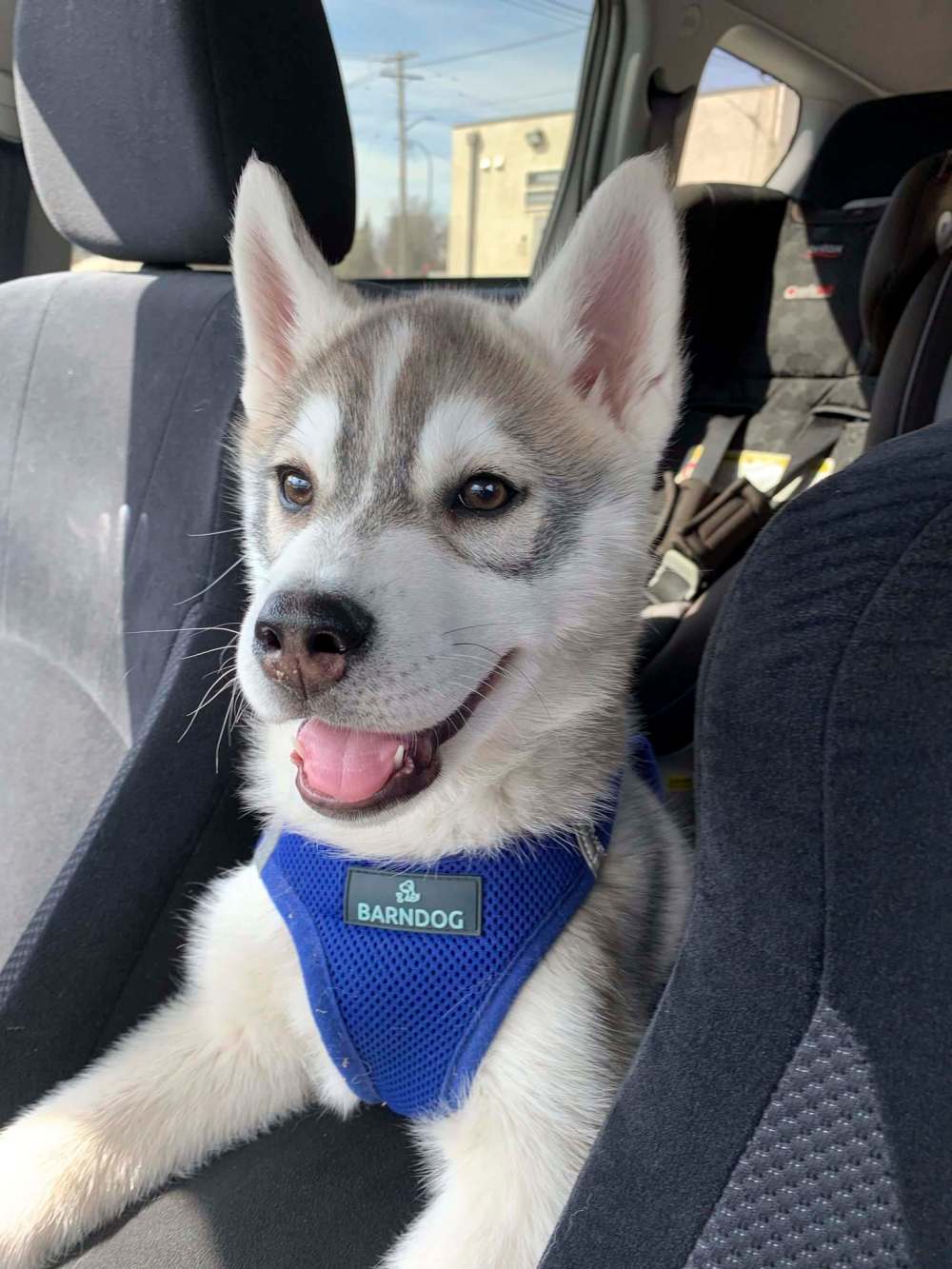
“The puppy is more work than my daughter was at six months,” she says with a laugh. “But he’s sleeping through the night, which is not a privilege we got with my daughter until she was much much older.”
Romanchuk’s husband has, historically, been fairly resistant to the idea of getting a dog. Romanchuk figured that fencing in their yard would be the thing to convince him; turns out it was a pandemic. “I said to him, if we are ever thinking about getting a dog, I think this would be a good time to do it because somebody is always going to be home.”
Snowball comes to them from a farm in rural Manitoba. “He’s a puppy so he gets into trouble, but it’s been a good experience for our family,” she says. “We’re getting out more, we’re close to a dog park.”
Romanchuk is a nurse, so she takes social distancing very seriously. Being able to distantly bond with other dog owners has been an unexpected perk. “You don’t really get to connect with people much, but when you go for walks and see people with dogs, you automatically have something in common.”
While Snowball has been a great fit for her family, Romanchuk recommends people really think about what their lives will look like when this is all over before they opt to adopt. If you were someone who was “never home” before the pandemic, for example, that’s something to consider.
“Make sure this is, long term, what your family is going to want. Quarantine is not going to be here forever, and dogs are not for everyone. They are a ton of work,” she says, adding that one must carefully consider the costs of care, food and pet insurance. “If you’re going to bring an animal into your home, you’re making a commitment to that animal.”
jen.zoratti@freepress.mb.ca
Twitter: @JenZoratti

Jen Zoratti is a Winnipeg Free Press columnist and author of the newsletter, NEXT, a weekly look towards a post-pandemic future.
Our newsroom depends on a growing audience of readers to power our journalism. If you are not a paid reader, please consider becoming a subscriber.
Our newsroom depends on its audience of readers to power our journalism. Thank you for your support.





